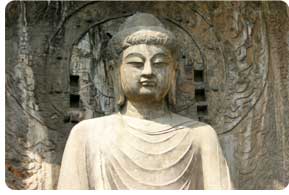 Luoyang is famous for its brilliant culture and long history. It is one of the six famous ancient capitals of China. It is encircled by Mangling Mountain in the north and Songshan Mountain in the south. Luoyang was the capital during 13 dynasties: Xia, Shang, West Zhou, Eastern Zhou, Eastern Han, Wei, Western Jin, Northern Wei, Sui, Tang, Later Liang, Later Tang and Later Jin, spanning 1,529 years.
Luoyang is famous for its brilliant culture and long history. It is one of the six famous ancient capitals of China. It is encircled by Mangling Mountain in the north and Songshan Mountain in the south. Luoyang was the capital during 13 dynasties: Xia, Shang, West Zhou, Eastern Zhou, Eastern Han, Wei, Western Jin, Northern Wei, Sui, Tang, Later Liang, Later Tang and Later Jin, spanning 1,529 years.
Archaeologist have discovered five city ruins from the Xia Dynasty, Shang Dynasty, Zhou Dynasty, Han and Wei Dynasties along the Luohe River. News of the discovery which was later called "Five Capitals along One River" soon spread around the world and accelerated Luoyang's reputation as a tourist destination. Its history as a capital has endowed Luoyang with quite a number of cultural relics such as capital city ruins, temples and cave sculptures, tombs and stone tablets. Luoyang boosts 11 cultural sites, over 400,000 relic items accounting for one thirteenth of that of the total in China. Longmen Grottoes is one of the three largest carved stone art repositories in China and the largest royal Buddhist stone carvings in the world. The site has been listed on the List of World Culture Heritage. Another well-known relic site, the White Horse Temple, the first Buddhism temple in China, was built about 1900 years ago when Buddhism was introduced into China. The temple has the reputation of being the "Home of Sakyamuni" or "Court for Ancestors". Guan Lin, the grave where the head of Guan Yu (a famous general of Kingdom Shu during Three Kingdom period) is buried, is one of the largest three commemorative graves for Guan Yu in the country. It has now become a holy site for overseas Chinese pilgrims, especially for those from the Southeast Asia. The "Six-horse Carriage Driven by the Emperor" excavated from an East Zhou Dynasty tomb has amazed the world. Qian Tang Zhi Zhai is the largest museum boosting the richest stone inscriptions from the Tang Dynasty. Mang Mountain in the north of Luoyang is the site of China's cemetery consisting of royal tombs from different dynasties. The mountain had for long been regarded by the royal families as place of geomantic importance.
Luoyang is one of the cradles of Chinese culture. The He-Luo Culture with "He Tu Luo Shu" as its representative is esteemed as the "Origin of Humanity". Luoyang is the place where Li-Yue, the basic institutional system used by feudal rulers to consolidate feudal power originated; the place where Taoism was founded and the place from where Buddhism was spread across the whole country. Luoyang is also home to three of the Four Great Inventions of China: printing, paper making art and the compass. The Huntian instrument - made on the basis of the knowledge of celestial bodies - and the seismograph by Zhang Heng also originated here.
Luoyang is characterized by fantastic natural scenery comprising numerous high mountains and serpentine rivers. In the north the roaring Yellow River is cut by the famous Xiao Lang Di Key Water Control Project, which has preserved a water area of over 272 square kilometers. Within Xiao Lang Di Scenic Area, glimmering waters are surrounded by rolling lands; rising isles covered with flourishing woods are home to countless birds. The beautiful landscape makes it an ideal spot to appreciate the peerless charming of China's Mother River.
Luoyang provides access to some great mountains in the surrounding regions. The Qingyao Mountain to the west of Luoyang is known as the "Secret Capital of Huang Di" (Huang Di, literally meaning, and commonly known as, the "Yellow Emperor", is often regarded as the first sovereign of the Chinese nation.).To the south of Luoyang lies the Songshang Mountain (the most important one of the five great mountains in China), Funiu Mountain, Huaguo Mountain.
The Luoyang Peony, displaying natural grace and of peerless beauty and celestial fragrance, has been regarded as the world’s No 1 flower since ancient times. The 68 large peony plantations in Luoyang boost over 900 varieties of peony such as the Yellow Yao, Purple Wei, Green Tou, Two Qiao, and Black Kui. Although growing many varieties of flowers has for long time been a custom of Luoyang people, the peony has always remained their first choice. The splendid images of the city dotted with a sea of flowers in profusion in spring time is most vividly depicted by a well known poem which reads every bloom causes a sensation in the capital; Although it blooms for only 20 days it charms everybody in the capital. Since 1983, over 2 million tourists and flowers lovers from all over the world have been drawn to the city by the annual Luoyang Peony Festival. Luoyang thus gains another title as "the Home of Peony". This annual festival helps propagate Luoyang peony across China and the rest of the world. |



